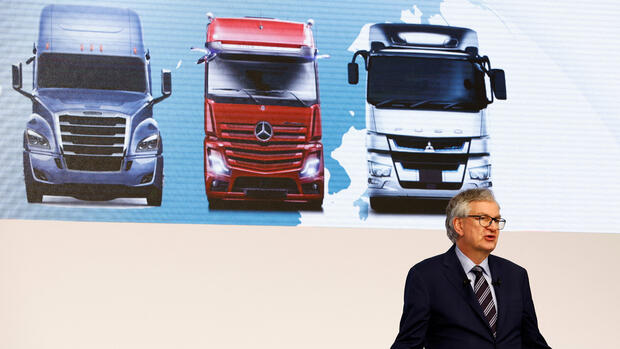Vienna, Tokyo A new heavyweight is emerging in the truck industry under the pressure to use more climate-friendly drives: The world’s largest truck manufacturer Daimler Truck and the Japanese Toyota group announced on Tuesday that they would be merging their commercial vehicle subsidiaries Mitsubishi Fuso and Hino Motors.
A declaration of intent has been signed for this purpose. A merger of equals is planned, the details of which are still being negotiated. A significant portion of the combined company’s shares, which will be listed on the Tokyo Stock Exchange, will be held by third parties.
The driving force behind the deal is likely to be the fierce competition in the light truck and commercial vehicle segment in Asia. On the other hand, insiders highlight the huge investments needed to electrify hundreds of thousands of trucks in the coming years. Looking ahead, greater economies of scale are essential.
Daimler Truck: Disappointing returns in Asia business
Although Daimler Truck does not publish a separate balance sheet from Fuso, the Japanese unit is likely to be responsible for the majority of the business volume of the Dax group’s Asia division. And this weakens properly. Last year, the operating profit of the Swabians in Asia plummeted from 427 to 171 million euros. That corresponds to a decrease of 60 percent.
With Fuso and the Indian subsidiary Bharat Benz, Daimler Truck was able to increase sales by nine percent to 156,000 vehicles. Sales even increased by 14 percent to around 6.5 billion euros. However, the adjusted return on sales was disappointing at 2.6 percent – especially since the other two divisions in North America and Europe were able to increase their margins significantly.
>> Read also: The US truck industry is in hydrogen fever
In the first quarter, the Asia division of Daimler Trucks was able to increase its profit margin to 4.6 percent. This means that the area is still not even half as profitable as the US company.
Daimler Truck has held a good 90 percent of the shares in Fuso since 2011. The company manufactures a variety of trucks and buses in Japan, India and Portugal. According to Fuso, it sells its vehicles in 170 countries.
Electrification of truck fleets should be pushed
Daimler Truck and Toyota have also agreed to consider potential risks related to the Hino emissions manipulation scandal when evaluating the Toyota subsidiary.
With the merger, both groups want to push the electrification of truck fleets in Asia. In addition to the battery, both companies also rely heavily on the hydrogen-based fuel cell. To this end, investments should also be made in technologies for networking vehicles and automated driving (CASE).
“There is a great future ahead of us – and today’s announcement is a crucial step in shaping that future economically and leading the way in sustainable transport,” said Martin Daum, CEO of Daimler Trucks. Toyota CEO Koji Sato added: “Our four companies will work together with a common vision to achieve carbon neutrality by strengthening CASE technologies.”
The company manufactures a variety of trucks and buses in Japan, India and Portugal.
(Photo: Reuters)
The Japanese adventure is drawing to a close for Daimler Trucks. In 2000, the then Daimler-Chrysler group joined the carmaker Mitsubishi Motors. At the time, analysts suspected that Daimler was primarily targeting the commercial vehicle subsidiary Mitsubishi Fuso.
And so it happened. Daimler separated from the ailing car business and kept Fuso. Over time, the group expanded the Japanese subsidiary into the core of the Asian business. Fuso became a competence center for smaller electric trucks such as the eCanter, the second generation of which is now rolling off the assembly line. The Kawasaki headquarters also houses a state-of-the-art design center that is part of Daimler Trucks global truck development.
Toyota subsidiary Hino is under economic pressure
Hino is part of the Toyota group and is fighting for market leadership in Japan. But that doesn’t protect the company from consolidation pressure. Sato’s predecessor, Akio Toyoda, had pushed the company to work more closely with local rivals Isuzu.
However, a scandal involving fake engine registrations increased the pressure on management. In March of the past financial year, global sales fell by 7.6 percent to around 145,000 trucks. In Japan, sales fell by 38 percent to 21,991 vehicles. Net profit shrank 58 percent to 15.8 billion yen (105 billion euros).
Details on the scope and nature of the collaboration, including name, location and ownership structure, are expected to be determined over the next 18 months. Daimler Truck and Toyota want to seal the final contracts at the beginning of next year, and the transaction should be completed by the end of 2024.
With agency material
More: Millions of Toyota vehicles are affected by data leaks.
